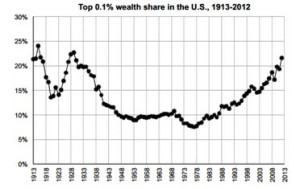
My friend Marshall Auerback sent the following insightful comment in response to the Jeff Madrick’s “Inequality Is Not the Problem”, which I distributed on 27 April 2014.
Recall that Jeff argued why the very real problems in the United States associated with concentration of wealth, growing income inequality, and low rates of social/income mobility should not be separated from the larger problem of stimulating overall economic growth. This is a subtle issue Marshall's comment helps to illuminate the relationship.
———————————
Marshall Auerback’s Comment —
I think Jeff's focus on absolute mobility, rather than relative mobility is the right one.
David Howell, a fellow economist who works with Jeff at the New School pointed out that –
“In rich northern European countries, the income distribution is much more compressed, so there is much less distance between the economic rungs (making mobility easier and less significant). In addition, in most other rich countries the bottom rung is propped up to much higher levels relative to the typical worker’s income via much higher minimum wages and social transfers. Being in the bottom 5th of the distribution in Sweden might be unfortunate, but in the US it is almost always a disaster.
Chetty/Saez focus on the conventional measure of relative mobility across generations. As such, it’s zero-sum: since it is measured across percentage rungs (e.g., quintiles) of the income distribution, upward mobility by some must be matched by downward mobility by others – there are always 20% in the bottom quintile.
In contrast, an absolute measure of mobility – how children’s incomes in middle age (after taxes and transfers) compare with their parent’s incomes at the same age, adjusted for inflation – is a far more meaningful measure of the ability of the economy to generate a sustained upward mobility of families to higher standards of living.”
A simpler way of looking at the problem [i.e., the degree of inequality] might be to think about it like this: above a certain moderate threshold, rising inequality can undermine social cohesion and the democratic process as financial elites increasingly dominate the political process. This, in turn, can squeeze wages as worker bargaining power declines. It also leads to inadequate investments in public goods, particularly those related to education, health, and the social safety net, as government budgets are also squeezed; a finance sector that is too large, wasteful, and destabilizing; and too little consumer income compensated for by too much household debt.
In essence, economic performance will be best in the long run if government plays an active regulatory, investment, and redistributive role, ensuring that middle-class households experience rising standards of living from market incomes (not debt). This model of shared growth is best promoted by a much more moderate and stable level of inequality than we have seen since the late 1970s.
[Spinney note: Here is a chart illuminating Marshall’s concern about the degree of rising inequality and shared growth: It shows how the per cent of total national wealth in the United States accumulating to the top 0.1% of the US population has changed since 1913. Note the profound changes that occurred after the stock market crash of 1929 and the emergence of the shared-growth consumer society after WWII as compared to the more recent return to unshared growth that occurred since rise of neo-liberal capitalism umber alles that began in Carter Administration — aka rise of deregulated casino capitalism.]

An important consequence is that average annual growth in the median income of American households—the typical, middle-class family—has been substantially slower than that of other large, rich countries. At the same time, even this meager income growth has been dependent upon increasing household hours of work.
In contrast to most other rich countries that have experienced a substantial decline in average work hours, American work hours—whether measured per worker or per adult—have increased, leading to less time for leisure or for working around the house (called by economists “household production”).
Compounding the pressure from stagnant incomes and rising hours of work, American working families pay far more out of pocket for essential education and health services than do their counterparts in other rich countries. The American public sector takes much less responsibility for early childhood education, for example, and this report concludes with an example that illustrates how poorly Americans are now performing on international tests of literacy and math proficiency, with potentially serious consequences for future economic competitiveness and prosperity.
Marshall Auerback



